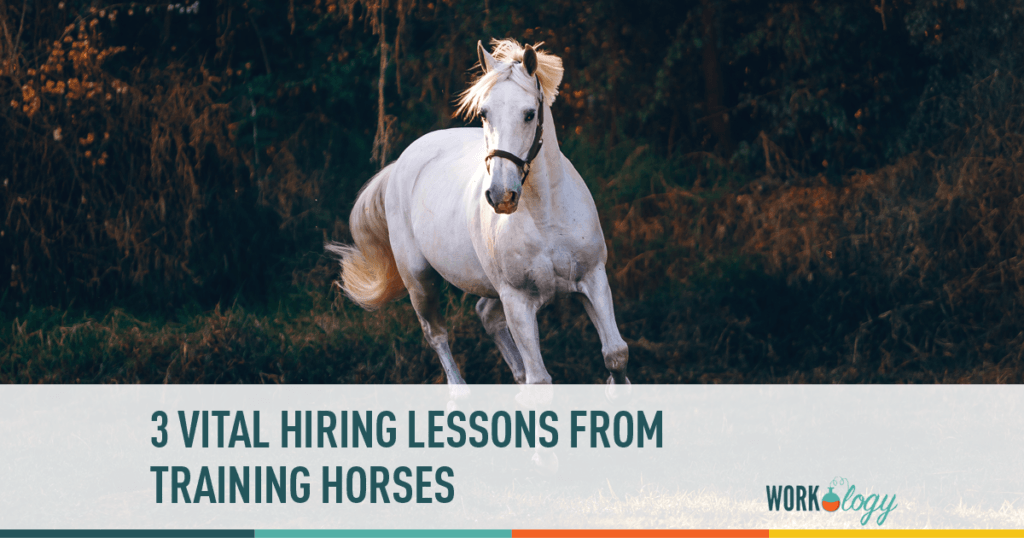I had the opportunity to conduct a blog interview with Jerry Davis, recruiter for Adventist Health System, and he shared important lessons the equine world taught him about recruiting. He probably didn’t know it at the time, but when he took ownership of Jake the horse—a 18-time race-winning Thoroughbred—the equine world would make him a better recruiter. But that’s exactly what happened.
Jerry Davis is a recruiter in the Adventist Health System, which has 130 open positions. He didn’t have a discussion with his horse, like he may have with Mr. Ed, the talking horse of the 1960s, but his interactions with Jake taught him a few essential lessons about people and about recruiting anyway.
My purpose here is to share those with you, so that you, too, can learn beautiful, bona fide wisdom from the equine world, just as Davis did. Only difference is you don’t have to saddle up or go in a stable for the purposes of this blog.
A Conversation with Jerry Davis
I asked, “What’s your main goal as a recruiter for Adventist Medical Center?” Davis said to “make sure we’re hiring the right people.”
Specifically, he wants to make sure the people are not only skilled employees, but they adhere to the unique mission and values of Adventist Medical Center, which separates them from other area hospitals.
So what does the equine world have to do with recruiting?
3 Vital Hiring Lessons from Training Horses
1. Horses don’t lie, but people might
JD: “The thing that’s amazing about the equine world is that horses don’t lie. They are a very straight up animal. If you’re paying attention to them, they will tell you how they feel and whether they want you to go away or whether they’re ready to embrace what you have to contribute to the partnership with a horse.
“I think that is a major part of it right there. So much about recruitment is listening to a person’s story and understanding where they’re coming from, because we all have stories—as far as I see it. Whether a person is striving toward excellence or if they’re just fluffing around. Part of the equine world (for me, anyway) helps me identify when people are truly being genuine, whether that’s over the phone or even in person. Understanding being real, being genuine I think is so much a part of working with horses and I think that’s very true of working with people, as well.”
My Takeaway
I appreciated the insight that so much about recruitment is listening to their story and listening to where they’re coming from, whether they’re fluffing, and whether they’re being genuine.
2. Learning body language takes time
JD: “The body language of a horse is very clear after you’ve had a chance to really watch and study it. It takes time to acquire that. It’s basically spending time and seeing that horse, and being acquainted with the horse. What do they look like when they’re relaxed, when they’re full of energy, and all of the range of emotions in between.
“It’s their ears, where they have their head positioned, how aligned is their spine—the whole horse is a communication mechanism really. Are they facing you, is their back to you, or are they turned sideways—it’s all communication.”
My Takeaway
Studying the body language of people takes time and intentionality, but it’s a skill that recruiters must acquire in order to hire well.
3. Trust your instincts and your team
JD: “Going out to the stable is kind of like going to an oasis of time and a place where time stands still, where your senses are heightened. When you’re in tune with the horse, they are focused on two primary things:
- They don’t want to be alone
- They’re naturally claustrophobic, so they don’t want to be in tight spaces.
“But when they trust you to go in a horse trailer, which is claustaphobic to them, there are a lot of dynamics that are happening—Do I trust this person or do I trust my own instincts? Which is stronger?
“The value really comes into play revolving around that spirit of trust. Trusting your instincts and trusting the people around you, and being able to measure the two against each other.”
“When I’m talking with a potential candidate, there’s a fair amount of checking with your gut, if you will: How do you feel about this person? Is there something that your radar is setting off? You have to look at that from both directions of trusting your instincts.
“I think the horse world heightens those instincts, strengthens those instincts.”
My Takeaway
Just like a horse trusts their instincts about people, recruiters must trust their instincts about people. This comes with time and experience; it’s not automatic—it requires an intentional decision. This is important for the individual and for the team when making hiring decisions.
Detecting Lies, Reading Body Language, and Learning to Trust
The temptation in recruiting is to trust situations and candidates at face value, when you’re instincts may be telling you something beyond what the eye can see. Learning how to pick up on lies, detect body language, and trust your instincts enough to act on those are important in the equine world, and they’re important when making hiring decisions.
What’s at stake is both the integrity of the recruiter and the organization. We can all learn something from the world of equine here, whether it’s an encouragement to keep on trusting the instincts we’ve developed, or to pay more attention to the daily decisions we make and strengthen those instincts.








